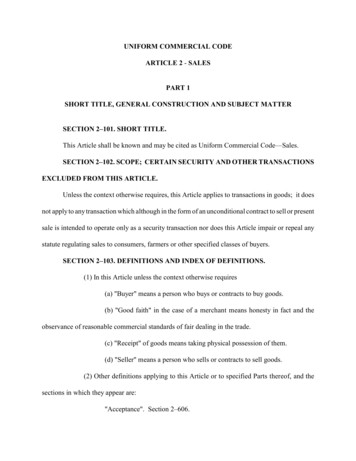
Transcription
UNIFORM COMMERCIAL CODEARTICLE 2 - SALESPART 1SHORT TITLE, GENERAL CONSTRUCTION AND SUBJECT MATTERSECTION 2–101. SHORT TITLE.This Article shall be known and may be cited as Uniform Commercial Code—Sales.SECTION 2–102. SCOPE; CERTAIN SECURITY AND OTHER TRANSACTIONSEXCLUDED FROM THIS ARTICLE.Unless the context otherwise requires, this Article applies to transactions in goods; it doesnot apply to any transaction which although in the form of an unconditional contract to sell or presentsale is intended to operate only as a security transaction nor does this Article impair or repeal anystatute regulating sales to consumers, farmers or other specified classes of buyers.SECTION 2–103. DEFINITIONS AND INDEX OF DEFINITIONS.(1) In this Article unless the context otherwise requires(a) "Buyer" means a person who buys or contracts to buy goods.(b) "Good faith" in the case of a merchant means honesty in fact and theobservance of reasonable commercial standards of fair dealing in the trade.(c) "Receipt" of goods means taking physical possession of them.(d) "Seller" means a person who sells or contracts to sell goods.(2) Other definitions applying to this Article or to specified Parts thereof, and thesections in which they appear are:"Acceptance". Section 2–606.
"Banker's credit". Section 2–325."Between merchants". Section 2–104."Cancellation". Section 2–106(4)."Commercial unit". Section 2–105."Confirmed credit". Section 2–325."Conforming to contract". Section 2–106."Contract for sale". Section 2–106."Cover". Section 2–712."Entrusting". Section 2–403."Financing agency". Section 2–104."Future goods". Section 2–105."Goods". Section 2–105."Identification". Section 2–501."Installment contract". Section 2–612."Letter of Credit". Section 2–325."Lot". Section 2–105."Merchant". Section 2–104."Overseas". Section 2–323."Person in position of seller". Section 2–707."Present sale". Section 2–106."Sale". Section 2–106."Sale on approval". Section 2–326."Sale or return". Section 2–326."Termination". Section 2–106.(3) The following definitions in other Articles apply to this Article:"Check". Section 3–104."Consignee". Section 7–102."Consignor". Section 7–102."Consumer goods". Section 9–109."Dishonor". Section 3–502."Draft". Section 3–104.(4) In addition Article 1 contains general definitions and principles of constructionand interpretation applicable throughout this Article.As amended in 1994.
SECTION 2–104. DEFINITIONS: "MERCHANT"; "BETWEEN MERCHANTS";"FINANCING AGENCY".(1) "Merchant" means a person who deals in goods of the kind or otherwise by hisoccupation holds himself out as having knowledge or skill peculiar to the practices or goods involvedin the transaction or to whom such knowledge or skill may be attributed by his employment of anagent or broker or other intermediary who by his occupation holds himself out as having suchknowledge or skill.(2) "Financing agency" means a bank, finance company or other person who in theordinary course of business makes advances against goods or documents of title or who byarrangement with either the seller or the buyer intervenes in ordinary course to make or collectpayment due or claimed under the contract for sale, as by purchasing or paying the seller's draft ormaking advances against it or by merely taking it for collection whether or not documents of titleaccompany the draft. "Financing agency" includes also a bank or other person who similarlyintervenes between persons who are in the position of seller and buyer in respect to the goods(Section 2–707).(3) "Between merchants" means in any transaction with respect to which both partiesare chargeable with the knowledge or skill of merchants.SECTION 2–105. DEFINITIONS: "TRANSFERABILITY"; "GOODS"; "FUTURE"GOODS; "LOT"; "COMMERCIAL UNIT".(1) "Goods" means all things (including specially manufactured goods) which aremovable at the time of identification to the contract for sale other than the money in which the priceis to be paid, investment securities (Article 8) and things in action. "Goods" also includes the unborn
young of animals and growing crops and other identified things attached to realty as described in thesection on goods to be severed from realty (Section 2–107).(2) Goods must be both existing and identified before any interest in them can pass.Goods which are not both existing and identified are "future" goods. A purported present sale offuture goods or of any interest therein operates as a contract to sell.(3) There may be a sale of a part interest in existing identified goods.(4) An undivided share in an identified bulk of fungible goods is sufficientlyidentified to be sold although the quantity of the bulk is not determined. Any agreed proportion ofsuch a bulk or any quantity thereof agreed upon by number, weight or other measure may to theextent of the seller's interest in the bulk be sold to the buyer who then becomes an owner in common.(5) "Lot" means a parcel or a single article which is the subject matter of a separatesale or delivery, whether or not it is sufficient to perform the contract.(6) "Commercial unit" means such a unit of goods as by commercial usage is a singlewhole for purposes of sale and division of which materially impairs its character or value on themarket or in use. A commercial unit may be a single article (as a machine) or a set of articles (as asuite of furniture or an assortment of sizes) or a quantity (as a bale, gross, or carload) or any otherunit treated in use or in the relevant market as a single MENT";"CONTRACT FOR SALES"; "SALE"; "PRESENT SALE"; "CONFORMING" TOCONTRACT; "TERMINATION"; "CANCELLATION".(1) In this Article unless the context otherwise requires "contract" and "agreement"are limited to those relating to the present or future sale of goods. "Contract for sale" includes both
a present sale of goods and a contract to sell goods at a future time. A "sale" consists in the passingof title from the seller to the buyer for a price (Section 2–401). A "present sale" means a sale whichis accomplished by the making of the contract.(2) Goods or conduct including any part of a performance are "conforming" orconform to the contract when they are in accordance with the obligations under the contract.(3) "Termination" occurs when either party pursuant to a power created by agreementor law puts an end to the contract otherwise than for its breach. On "termination" all obligationswhich are still executory on both sides are discharged but any right based on prior breach orperformance survives.(4) "Cancellation" occurs when either party puts an end to the contract for breach bythe other and its effect is the same as that of "termination" except that the cancelling party alsoretains any remedy for breach of the whole contract or any unperformed balance.SECTION 2–107. GOODS TO BE SEVERED FROM REALTY: RECORDING.(1) A contract for the sale of minerals or the like (including oil and gas) or a structureor its materials to be removed from realty is a contract for the sale of goods within this Article if theyare to be severed by the seller but until severance a purported present sale thereof which is noteffective as a transfer of an interest in land is effective only as a contract to sell.(2) A contract for the sale apart from the land of growing crops or other thingsattached to realty and capable of severance without material harm thereto but not described insubsection (1) or of timber to be cut is a contract for the sale of goods within this Article whetherthe subject matter is to be severed by the buyer or by the seller even though it forms part of the realtyat the time of contracting, and the parties can by identification effect a present sale before severance.
(3) The provisions of this section are subject to any third party rights provided by thelaw relating to realty records, and the contract for sale may be executed and recorded as a documenttransferring an interest in land and shall then constitute notice to third parties of the buyer's rightsunder the contract for sale.As amended in 1972.PART 2FORM, FORMATION AND READJUSTMENT OF CONTRACTSECTION 2–201. FORMAL REQUIREMENTS; STATUTE OF FRAUDS.(1) Except as otherwise provided in this section a contract for the sale of goods forthe price of 500 or more is not enforceable by way of action or defense unless there is some writingsufficient to indicate that a contract for sale has been made between the parties and signed by theparty against whom enforcement is sought or by his authorized agent or broker. A writing is notinsufficient because it omits or incorrectly states a term agreed upon but the contract is notenforceable under this paragraph beyond the quantity of goods shown in such writing.(2) Between merchants if within a reasonable time a writing in confirmation of thecontract and sufficient against the sender is received and the party receiving it has reason to knowits contents, it satisfies the requirements of subsection (1) against such party unless written noticeof objection to its contents is given within 10 days after it is received.(3) A contract which does not satisfy the requirements of subsection (1) but whichis valid in other respects is enforceable(a) if the goods are to be specially manufactured for the buyer and are notsuitable for sale to others in the ordinary course of the seller's business and the seller, before notice
of repudiation is received and under circumstances which reasonably indicate that the goods are forthe buyer, has made either a substantial beginning of their manufacture or commitments for theirprocurement; or(b) if the party against whom enforcement is sought admits in his pleading,testimony or otherwise in court that a contract for sale was made, but the contract is not enforceableunder this provision beyond the quantity of goods admitted; or(c) with respect to goods for which payment has been made and accepted orwhich have been received and accepted (Sec. 2–606).SECTION 2–202. FINAL WRITTEN EXPRESSION: PAROL OR EXTRINSICEVIDENCE.Terms with respect to which the confirmatory memoranda of the parties agree or which areotherwise set forth in a writing intended by the parties as a final expression of their agreement withrespect to such terms as are included therein may not be contradicted by evidence of any prioragreement or of a contemporaneous oral agreement but may be explained or supplemented(a) by course of dealing or usage of trade (Section 1–205) or by course of performance(Section 2–208); and(b) by evidence of consistent additional terms unless the court finds the writing tohave been intended also as a complete and exclusive statement of the terms of the agreement.SECTION 2–203. SEALS INOPERATIVE.The affixing of a seal to a writing evidencing a contract for sale or an offer to buy or sellgoods does not constitute the writing a sealed instrument and the law with respect to sealedinstruments does not apply to such a contract or offer.
SECTION 2–204. FORMATION IN GENERAL.(1) A contract for sale of goods may be made in any manner sufficient to showagreement, including conduct by both parties which recognizes the existence of such a contract.(2) An agreement sufficient to constitute a contract for sale may be found even thoughthe moment of its making is undetermined.(3) Even though one or more terms are left open a contract for sale does not fail forindefiniteness if the parties have intended to make a contract and there is a reasonably certain basisfor giving an appropriate remedy.SECTION 2–205. FIRM OFFERS.An offer by a merchant to buy or sell goods in a signed writing which by its termsgives assurance that it will be held open is not revocable, for lack of consideration, during the timestated or if no time is stated for a reasonable time, but in no event may such period of irrevocabilityexceed three months; but any such term of assurance on a form supplied by the offeree must beseparately signed by the offeror.SECTION 2–206. OFFER AND ACCEPTANCE IN FORMATION OF CONTRACT.(1) Unless otherwise unambiguously indicated by the language or circumstances(a) an offer to make a contract shall be construed as inviting acceptance in anymanner and by any medium reasonable in the circumstances;(b) an order or other offer to buy goods for prompt or current shipment shallbe construed as inviting acceptance either by a prompt promise to ship or by the prompt or currentshipment of conforming or non-conforming goods, but such a shipment of non-conforming goods
does not constitute an acceptance if the seller seasonably notifies the buyer that the shipment isoffered only as an accommodation to the buyer.(2) Where the beginning of a requested performance is a reasonable mode ofacceptance an offeror who is not notified of acceptance within a reasonable time may treat the offeras having lapsed before acceptance.SECTION 2–207. ADDITIONAL TERMS IN ACCEPTANCE OR CONFIRMATION.(1) A definite and seasonable expression of acceptance or a written confirmationwhich is sent within a reasonable time operates as an acceptance even though it states termsadditional to or different from those offered or agreed upon, unless acceptance is expressly madeconditional on assent to the additional or different terms.(2) The additional terms are to be construed as proposals for addition to the contract.Between merchants such terms become part of the contract unless:(a) the offer expressly limits acceptance to the terms of the offer;(b) they materially alter it; or(c) notification of objection to them has already been given or is given withina reasonable time after notice of them is received.(3) Conduct by both parties which recognizes the existence of a contract is sufficientto establish a contract for sale although the writings of the parties do not otherwise establish acontract. In such case the terms of the particular contract consist of those terms on which thewritings of the parties agree, together with any supplementary terms incorporated under any otherprovisions of this Act.
RUCTION.(1) Where the contract for sale involves repeated occasions for performance by eitherparty with knowledge of the nature of the performance and opportunity for objection to it by theother, any course of performance accepted or acquiesced in without objection shall be relevant todetermine the meaning of the agreement.(2) The express terms of the agreement and any such course of performance, as wellas any course of dealing and usage of trade, shall be construed whenever reasonable as consistentwith each other; but when such construction is unreasonable, express terms shall control course ofperformance and course of performance shall control both course of dealing and usage of trade(Section 1–205).(3) Subject to the provisions of the next section on modification and waiver, suchcourse of performance shall be relevant to show a waiver or modification of any term inconsistentwith such course of performance.SECTION 2–209. MODIFICATION, RECISSION AND WAIVER.(1) An agreement modifying a contract within this Article needs no consideration tobe binding.(2) A signed agreement which excludes modification or rescission except by a signedwriting cannot be otherwise modified or rescinded, but except as between merchants such arequirement on a form supplied by the merchant must be separately signed by the other party.(3) The requirements of the statute of frauds section of this Article (Section 2–201)must be satisfied if the contract as modified is within its provisions.
(4) Although an attempt at modification or rescission does not satisfy therequirements of subsection (2) or (3) it can operate as a waiver.(5) A party who has made a waiver affecting an executory portion of the contract mayretract the waiver by reasonable notification received by the other party that strict performance willbe required of any term waived, unless the retraction would be unjust in view of a material changeof position in reliance on the waiver.SECTION 2–210.DELEGATION OF PERFORMANCE; ASSIGNMENT OFRIGHTS.(1) A party may perform his duty through a delegate unless otherwise agreed or unlessthe other party has a substantial interest in having his original promisor perform or control the actsrequired by the contract. No delegation of performance relieves the party delegating of any duty toperform or any liability for breach.(2) Unless otherwise agreed all rights of either seller or buyer can be assigned exceptwhere the assignment would materially change the duty of the other party, or increase materially theburden or risk imposed on him by his contract, or impair materially his chance of obtaining returnperformance. A right to damages for breach of the whole contract or a right arising out of theassignor's due performance of his entire obligation can be assigned despite agreement otherwise.(3) Unless the circumstances indicate the contrary a prohibition of assignment of "thecontract" is to be construed as barring only the delegation to the assignee of the assignor'sperformance.(4) An assignment of "the contract" or of "all my rights under the contract" or anassignment in similar general terms is an assignment of rights and unless the language or the
circumstances (as in an assignment for security) indicate the contrary, it is a delegation ofperformance of the duties of the assignor and its acceptance by the assignee constitutes a promiseby him to perform those duties. This promise is enforceable by either the assignor or the other partyto the original contract.(5) The other party may treat any assignment which delegates performance as creatingreasonable grounds for insecurity and may without prejudice to his rights against the assignordemand assurances from the assignee (Section 2–609).PART 3GENERAL OBLIGATION AND CONSTRUCTION OF CONTRACTSECTION 2–301. GENERAL OBLIGATIONS OF PARTIES.The obligation of the seller is to transfer and deliver and that of the buyer is to accept and payin accordance with the contract.§ 2–302. Unconscionable Contract or Clause.(1) If the court as a matter of law finds the contract or any clause of the contract to have beenunconscionable at the time it was made the court may refuse to enforce the contract, or it mayenforce the remainder of the contract without the unconscionable clause, or it may so limit theapplication of any unconscionable clause as to avoid any unconscionable result.(2) When it is claimed or appears to the court that the contract or any clause thereof may beunconscionable the parties shall be afforded a reasonable opportunity to present evidence as to itscommercial setting, purpose and effect to aid the court in making the determination.§ 2–303. Allocation or Division of Risks.Where this Article allocates a risk or a burden as between the parties "unless otherwiseagreed", the agreement may not only shift the allocation but may also divide the risk or burden.
§ 2–304. Price Payable in Money, Goods, Realty, or Otherwise.(1) The price can be made payable in money or otherwise. If it is payable in whole or in partin goods each party is a seller of the goods which he is to transfer.(2) Even though all or part of the price is payable in an interest in realty the transfer of thegoods and the seller's obligations with reference to them are subject to this Article, but not thetransfer of the interest in realty or the transferor's obligations in connection therewith.§ 2–305. Open Price Term.(1) The parties if they so intend can conclude a contract for sale even though the price is notsettled. In such a case the price is a reasonable price at the time for delivery if(a) nothing is said as to price; or(b) the price is left to be agreed by the parties and they fail to agree; or(c) the price is to be fixed in terms of some agreed market or other standard as set or recordedby a third person or agency and it is not so set or recorded.(2) A price to be fixed by the seller or by the buyer means a price for him to fix in good faith.(3) When a price left to be fixed otherwise than by agreement of the parties fails to be fixedthrough fault of one party the other may at his option treat the contract as cancelled or himself fixa reasonable price.(4) Where, however, the parties intend not to be bound unless the price be fixed or agreedand it is not fixed or agreed there is no contract. In such a case the buyer must return any goodsalready received or if unable so to do must pay their reasonable value at the time of delivery and theseller must return any portion of the price paid on account.§ 2–306. Output, Requirements and Exclusive Dealings.(1) A term which measures the quantity by the output of the seller or the requirements of thebuyer means such actual output or requirements as may occur in good faith, except that no quantityunreasonably disproportionate to any stated estimate or in the absence of a stated estimate to anynormal or otherwise comparable prior output or requirements may be tendered or demanded.(2) A lawful agreement by either the seller or the buyer for exclusive dealing in the kind ofgoods concerned imposes unless otherwise agreed an obligation by the seller to use best efforts tosupply the goods and by the buyer to use best efforts to promote their sale.
§ 2–307. Delivery in Single Lot or Several Lots.Unless otherwise agreed all goods called for by a contract for sale must be tendered in asingle delivery and payment is due only on such tender but where the circumstances give either partythe right to make or demand delivery in lots the price if it can be apportioned may be demanded foreach lot.§ 2–308. Absence of Specified Place for Delivery.Unless otherwise agreed(a) the place for delivery of goods is the seller's place of business or if he has none hisresidence; but(b) in a contract for sale of identified goods which to the knowledge of the parties at the timeof contracting are in some other place, that place is the place for their delivery; and(c) documents of title may be delivered through customary banking channels.§ 2–309. Absence of Specific Time Provisions; Notice of Termination.(1) The time for shipment or delivery or any other action under a contract if not provided inthis Article or agreed upon shall be a reasonable time.(2) Where the contract provides for successive performances but is indefinite in duration itis valid for a reasonable time but unless otherwise agreed may be terminated at any time by eitherparty.(3) Termination of a contract by one party except on the happening of an agreed eventrequires that reasonable notification be received by the other party and an agreement dispensing withnotification is invalid if its operation would be unconscionable.§ 2–310. Open Time for Payment or Running of Credit; Authority to Ship Under Reservation.Unless otherwise agreed(a) payment is due at the time and place at which the buyer is to receive the goods eventhough the place of shipment is the place of delivery; and(b) if the seller is authorized to send the goods he may ship them under reservation, and maytender the documents of title, but the buyer may inspect the goods after their arrival before
payment is due unless such inspection is inconsistent with the terms of the contract (Section2–513); and(c) if delivery is authorized and made by way of documents of title otherwise than bysubsection (b) then payment is due at the time and place at which the buyer is to receive thedocuments regardless of where the goods are to be received; and(d) where the seller is required or authorized to ship the goods on credit the credit period runsfrom the time of shipment but post-dating the invoice or delaying its dispatch willcorrespondingly delay the starting of the credit period.§ 2–311. Options and Cooperation Respecting Performance.(1) An agreement for sale which is otherwise sufficiently definite (subsection (3) of Section2–204) to be a contract is not made invalid by the fact that it leaves particulars of performance to bespecified by one of the parties. Any such specification must be made in good faith and within limitsset by commercial reasonableness.(2) Unless otherwise agreed specifications relating to assortment of the goods are at thebuyer's option and except as otherwise provided in subsections (1)(c) and (3) of Section 2–319specifications or arrangements relating to shipment are at the seller's option.(3) Where such specification would materially affect the other party's performance but is notseasonably made or where one party's cooperation is necessary to the agreed performance of theother but is not seasonably forthcoming, the other party in addition to all other remedies(a) is excused for any resulting delay in his own performance; and(b) may also either proceed to perform in any reasonable manner or after the time for amaterial part of his own performance treat the failure to specify or to cooperate as a breachby failure to deliver or accept the goods.§ 2–312. Warranty of Title and Against Infringement;Infringement.Buyer's Obligation Against(1) Subject to subsection (2) there is in a contract for sale a warranty by the seller that(a) the title conveyed shall be good, and its transfer rightful; and(b) the goods shall be delivered free from any security interest or other lien or encumbranceof which the buyer at the time of contracting has no knowledge.(2) A warranty under subsection (1) will be excluded or modified only by specific language
or by circumstances which give the buyer reason to know that the person selling does not claim titlein himself or that he is purporting to sell only such right or title as he or a third person may have.(3) Unless otherwise agreed a seller who is a merchant regularly dealing in goods of the kindwarrants that the goods shall be delivered free of the rightful claim of any third person by way ofinfringement or the like but a buyer who furnishes specifications to the seller must hold the sellerharmless against any such claim which arises out of compliance with the specifications.§ 2–313. Express Warranties by Affirmation, Promise, Description, Sample.(1) Express warranties by the seller are created as follows:(a) Any affirmation of fact or promise made by the seller to the buyer which relates to thegoods and becomes part of the basis of the bargain creates an express warranty that the goodsshall conform to the affirmation or promise.(b) Any description of the goods which is made part of the basis of the bargain creates anexpress warranty that the goods shall conform to the description.(c) Any sample or model which is made part of the basis of the bargain creates an expresswarranty that the whole of the goods shall conform to the sample or model.(2) It is not necessary to the creation of an express warranty that the seller use formal wordssuch as "warrant" or "guarantee" or that he have a specific intention to make a warranty, but anaffirmation merely of the value of the goods or a statement purporting to be merely the seller'sopinion or commendation of the goods does not create a warranty.§ 2–314. Implied Warranty: Merchantability; Usage of Trade.(1) Unless excluded or modified (Section 2–316), a warranty that the goods shall bemerchantable is implied in a contract for their sale if the seller is a merchant with respect to goodsof that kind. Under this section the serving for value of food or drink to be consumed either on thepremises or elsewhere is a sale.(2) Goods to be merchantable must be at least such as(a) pass without objection in the trade under the contract description; and(b) in the case of fungible goods, are of fair average quality within the description; and(c) are fit for the ordinary purposes for which such goods are used; and(d) run, within the variations permitted by the agreement, of even kind, quality and quantity
within each unit and among all units involved; and(e) are adequately contained, packaged, and labeled as the agreement may require; and(f) conform to the promise or affirmations of fact made on the container or
UNIFORM COMMERCIAL CODE ARTICLE 2 - SALES PART 1 SHORT TITLE, GENERAL CONSTRUCTION AND SUBJECT MATTER SECTION 2-101. SHORT TITLE. This Article shall be known and may be cited as Uniform Commercial Code—Sales. SECTI ON 2-102. SCOPE; CERTAIN SECURITY AND OTHER TRANSACTIONS EXCLUDED FROM THIS ARTICLE.

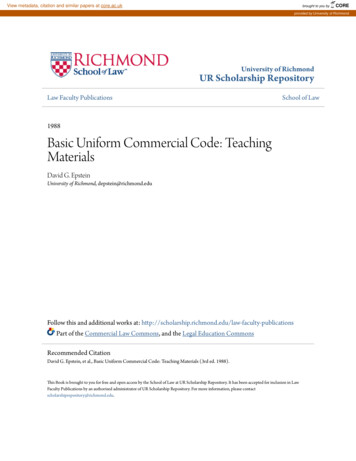
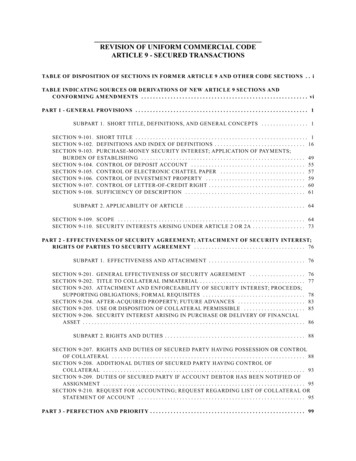
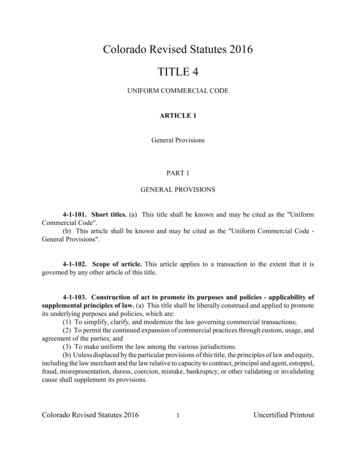
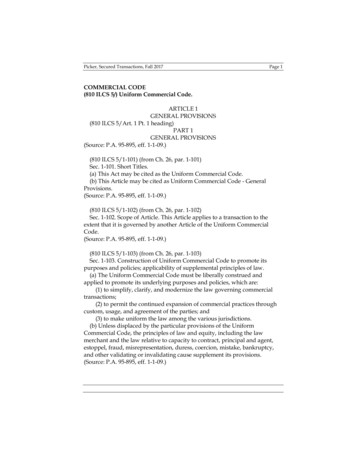
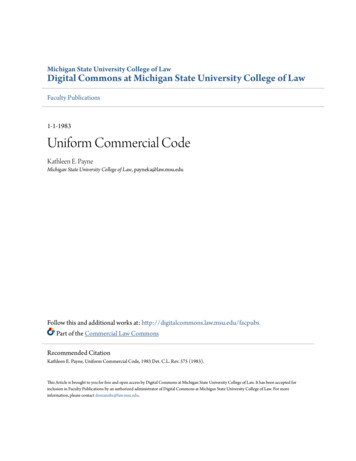
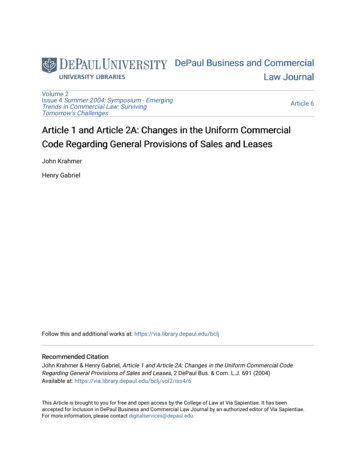
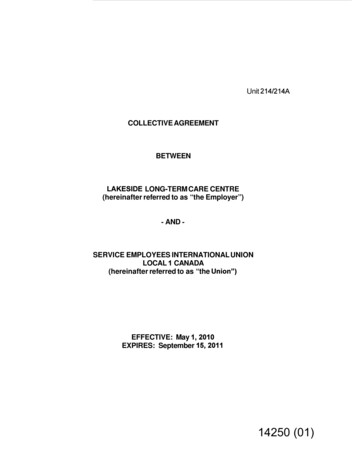

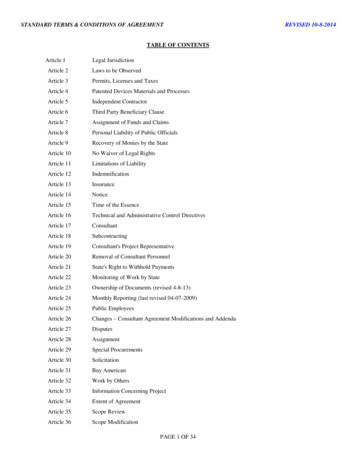
![Solar Code Development v2.5 [Read-Only]](/img/63/solar-20code-20development-20vfinal.jpg)